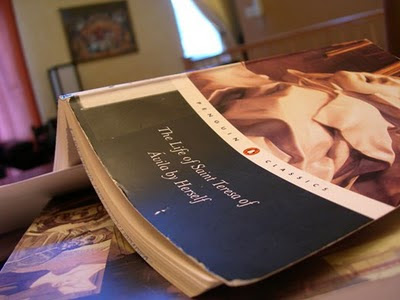 Yesterday, I handed in my last two papers of the semester. As it happens, they both addressed the issue of transformation. WARNING: when you write about a topic, very often you get to experience it! This should come as no surprise, because you don't really learn about something until you live it. In my Reformation class, I wrote a paper about the journey of reformer, Teresa of Avila (1515-1582).
Yesterday, I handed in my last two papers of the semester. As it happens, they both addressed the issue of transformation. WARNING: when you write about a topic, very often you get to experience it! This should come as no surprise, because you don't really learn about something until you live it. In my Reformation class, I wrote a paper about the journey of reformer, Teresa of Avila (1515-1582).Here's a quote from my introduction: The simple imposition of structural change or new organizational rules from an external source does not result in any lasting transformation unless these coincide with a radical shift in the souls and in the minds of the persons who are at the heart of change. If there is no one who believes that certain modifications are vital to well-being and if there are none who are passionate enough about these revisions to suffer the hardships that come with the incorporation of innovations, reform will not survive.
Here are the 4 important components of transformation that I observed in Teresa's life (and the lives of other reformers).:
1. Turmoil - A dissatisfaction with the state of things, or the state of their own hearts, often proved to be an impetus for agents of major change like the reformers. I know from experience that when I start to feel unsettled, ill at ease, or have internal anxiety, it is an invitation to transformation, to move forward into something unknown and unfamiliar. Turmoil shocks me out of my comfort zone and urges me to get out of my seat of complacency. Turmoil is my prodding friend that tells me to get off my butt and do something about the situation, no matter how daunting or scary it is.
2. Humility - This is not wallowing in my own wretchedness, nor being weak or cowardly. Humility is seeing myself in relation to God, which makes me realise that I am pretty small and not so good. But, humility is what fosters openness and reliance on God and that's really good! I need to hug humility close all the time and never let it go. It keeps me on track with truth.
3. Surrender - If I don't surrender, it means I don't trust. Teresa described surrender as making your will the prisoner of God. It doesn't mean going limp and being passive: it means that I want what God wants, and that's a whole lot more than I usually let myself want.
4. Tenacity - Never give up. Never stop. Transformation takes a lifetime. There was a period of almost 20 years during which Teresa saw very little progress in her spiritual life, but after that, things started to change! She opened her first reformed convent at the age of 47. Expect suffering, setbacks, opposition, and personal weakness. These things develop courage and patience and strength. Resistance is what builds muscle! It is those who don't abandon the journey that eventually get there. Teresa says: We ought to feel great alarm if we do not find ourselves advancing...for love is never idle. Therefore it is a very bad sign when one comes to a stand-still in virtue.
I never want to be standing still in my life. I want to be strong and steady, yes, but flexible and growing: a tree with deep roots, a strong trunk, branches that bend willingly, and leaves that flutter in the light and make gentle music in the breeze.
Here's one of my favourite quotes from Teresa: My Lord knows that all I desire is that he may be praised and magnified a little when men see how on a foul and stinking dunghill he has planted a garden of such sweet flowers.
May I be a very productive dung hill.
This is some of my research for my Teresa paper, cluttering up my table. I'll tell you about my other paper next time.
Comments